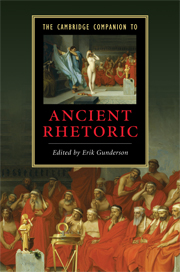Book contents
- Frontmatter
- Introduction
- Part 1 An archaeology of rhetoric
- Part II The field of language
- 4 Divisions of speech
- 5 Rhetoric, aesthetics, and the voice
- 6 The rhetoric of rhetorical theory
- 7 The politics of rhetorical education
- Part III The practice of rhetoric
- Part IV Epilogoues
- Appendix 1: Rhetorical terms
- Appendix 2: Authors and prominent individuals
- References
- Index of passages
- Index of subjects
- Series list
7 - The politics of rhetorical education
from Part II - The field of language
Published online by Cambridge University Press: 28 January 2010
- Frontmatter
- Introduction
- Part 1 An archaeology of rhetoric
- Part II The field of language
- 4 Divisions of speech
- 5 Rhetoric, aesthetics, and the voice
- 6 The rhetoric of rhetorical theory
- 7 The politics of rhetorical education
- Part III The practice of rhetoric
- Part IV Epilogoues
- Appendix 1: Rhetorical terms
- Appendix 2: Authors and prominent individuals
- References
- Index of passages
- Index of subjects
- Series list
Summary
Classical rhetorical discourse staked its claim for pedagogical authority on the basis of a string of ideas first and most memorably articulated by Isocrates - that speech is the capacity which, distinguishing human from beast, enables men to live harmoniously in communities, according to nature; that speaking well is thus the summit of human endeavor, helping to establish the rule of law and uphold just government; and consequently, that training in eloquence is the best education, transforming that which makes us human into the stuff of near-divine excellence (aretē). This, the essence of Isocrates’ rhetorical theory, became the model apologia for later writers, notably Cicero, who sought an ethical basis for their configuration of education around rhetorical training. Centuries later, Isocrates’ thought inspired the early modern European revival of classical pedagogy, engendered at a time when political and economic upheavals rendered it necessary to redefine the goal of education as creating active citizens rather than, as before, nobles, professionals, or priests.
The gist of his claim seems prima facie easy to dismiss. If the political community is the natural setting for the morally good life, as classical thinkers tend to agree, then moral judgment must be a key element in political action. But what exactly does learning to speak well have to do with learning to be good, let alone learning to apply moral goodness to deliberation regarding good action? It is precisely on this point that Plato inaugurates the long battle between what he calls “philosophy” and “rhetoric,” both terms whose early contours owe much to Platonic usage.
- Type
- Chapter
- Information
- The Cambridge Companion to Ancient Rhetoric , pp. 126 - 142Publisher: Cambridge University PressPrint publication year: 2009
- 10
- Cited by



